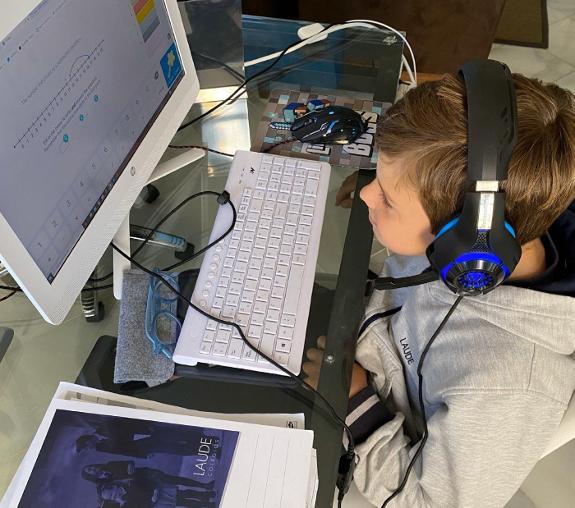New technologies allow students to keep learning during the lockdown
Since schools closed due to the coronavirus crisis, pupils have been engaging with their teachers via virtual platforms, as on-site lessons are replaced by online tuition
Jennie Rhodes
Viernes, 20 de marzo 2020, 17:19
Public and private education centres across the province have all had to adapt almost overnight to the coronavirus emergency.
There are 338,765 pupils in public primary and secondary education across the province, along with 22,575 teachers; they teach and learn at 1,213 public and subsidised schools. Add to that more than 35,000 students at the university or Malaga, as well as thousands more pupils and teachers in private schools and colleges.
Across the sector, teachers and other education professionals have adopted methods and learned how to use online technologies to continue to teach their students.
Schools are using online platforms such as Google Classrooms to upload exercises for their students in an attempt to keep up with the curriculum and some are even providing online classes thanks to video conferencing facilities like Skype and Zoom.
Joanne Murray, a secondary school English teacher in Malaga said, "Education was already heading towards a more technologically based approach but it is still generally lacking in schools." She explained that she and her colleagues spent "all weekend" setting up classes for the start of the school week.
This was also the case for many of the international schools on the Costa del Sol. However, as a number of them, including The British School of Malaga and Laude San Pedro International College, belong to international groups, they were able to learn from the experiences of sister schools in China and Italy, which had already closed. "As there were already alarm bells ringing we were able to come up with an emergency plan for our schools in Spain," explained Nick Campbell, Director of Education at ISP Europe, to which the two schools belong.
Principal of Laude San Pedro, Amanda Hughes, said in a statement that thanks to the virtual platform "the whole school is taking part in a complete daily timetable".
It is a similar picture at the Sotogrande International School, which also belongs to an international group and is able to "learn lessons" from other schools. Students there are also continuing with regular school hours, albeit online.
Director of The International School Estepona, Gillian Godbold, also reported on her school's preparations, "Our team have been working round the clock to be ready for 16 March and we went live at 9.30am as planned. Children from Year one to Year six can continue their studies remotely."
Malaga's Lycée Français has also adopted similar measures; teacher Rory O'Meara said it was "business as usual" but via the web.
With the demand for English qualifications high in Spain, private language academies have proliferated in recent years. The sector has also had to adapt rapidly to demonstrate to their students that online classes are a good substitute for on-site lessons.
Cofounder of Malaga's Babel language school, Angie Abá, explained that as a the lockdown looked more likely, she had to "think quickly" about how to manage the closure of three physical sites but continue to give classes online.
Joanna Firth of Atlántico in Rincón de la Victoria explained that the academy contacted all of their students individually to "make sure" that students could access the classes.
Although teachers have been keen to point out that it is early days, Fiona Dunbar, director of the ELI school said she has been "impressed" at how well students have adapted to the new way of working. Classes at FGUMA, the university of Malaga's general foundation, of which the Cambridge university exams forms part, have also been taking place online.
Embracing the new technologies has been both a fast-learning curve as well as an opportunity to discover new ways of working. However, as many teachers have experienced, not everyone has easy access to the internet or computers.
The education sector is facing a rapidly changing situation and the long-term effects are yet to be felt, but for now it's business as usual, online.
